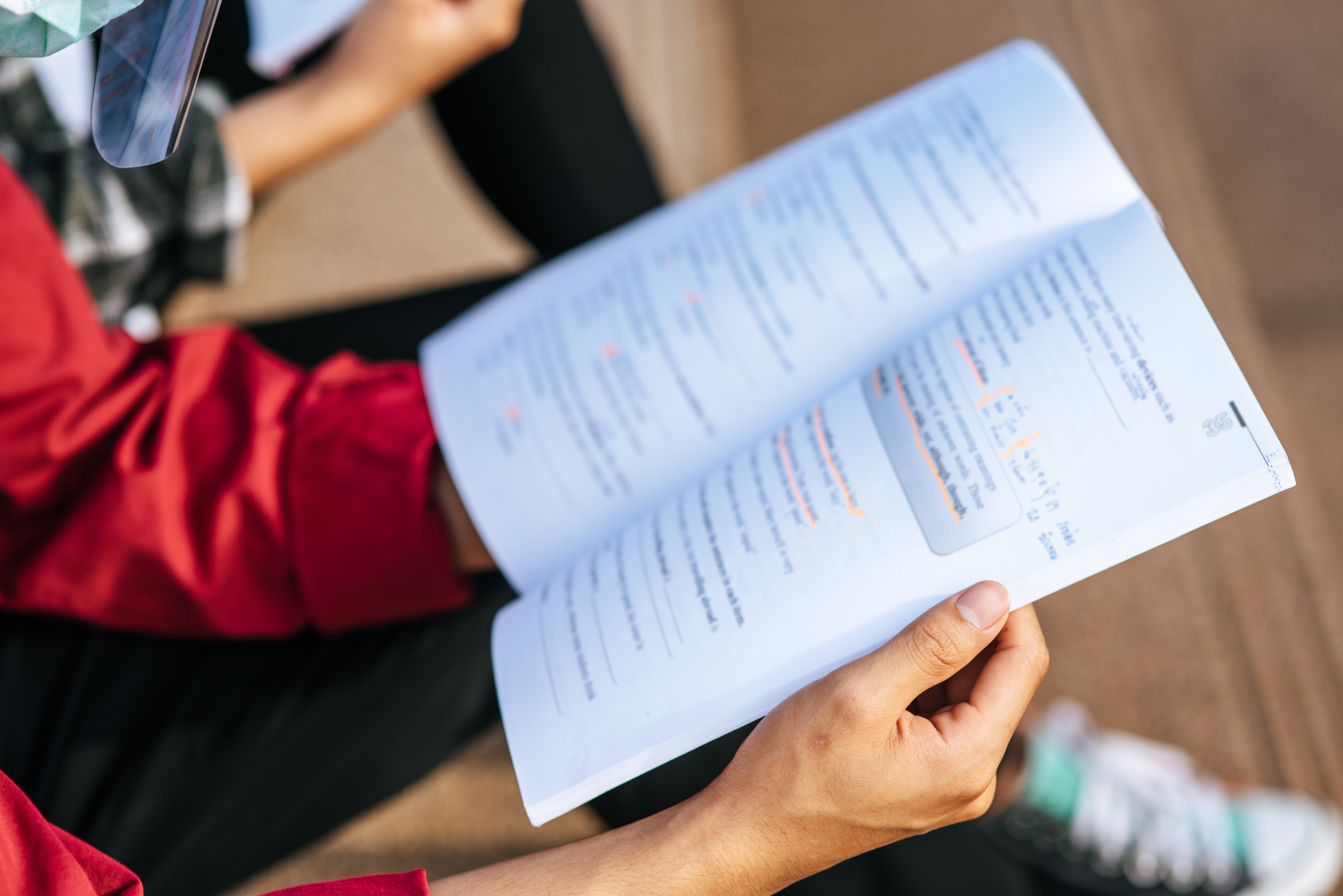Listen to this article
Study Skills
Revision tips: Study Buddy


Study Skills
Revision tips: Study Buddy


Study Skills
Revision tips: Study Buddy



Summary
Social support while revising, such as partnering with a friend, can help with motivating you to stay on task and show up for study sessions. Buddying also promotes interaction - discussing topics, quizzing each other, and explaining concepts, all proven methods for reinforcing knowledge and boosting memory recall.
Summary
Social support while revising, such as partnering with a friend, can help with motivating you to stay on task and show up for study sessions. Buddying also promotes interaction - discussing topics, quizzing each other, and explaining concepts, all proven methods for reinforcing knowledge and boosting memory recall.
Read this article
2m
Study buddying can be as simple as arranging to meet with a friend and then spending time revising together. This could be all that is needed to help motivate you to revise and to make you more productive. But, with a bit more planning, you may be able to see even more benefits:
Choose a compatible study buddy
Select a study partner who has similar academic goals and is committed to regular study sessions. Ideally, your study buddy should be someone whose approach to study aligns with yours or complements it in a way that encourages productive discussion.
Set clear goals and expectations
Before diving in, agree on what you hope to achieve through study buddying. Establish expectations around session frequency, topics to cover, and the amount of preparation needed for each session.
Plan structured sessions
Each study session should have a specific focus, whether it’s revising a particular topic, quizzing each other, or working through past exam questions. Structure and consistency help keep sessions focused and effective.
Engage in active discussion
Use sessions to discuss key concepts, ask each other questions, and explore different perspectives. Teaching concepts to one another can deepen understanding, as explaining material aloud solidifies knowledge.
Test each other regularly
Quiz each other on essential material, or create mini-tests to reinforce memory and understanding. Testing is a powerful tool for both assessing knowledge and practicing retrieval. Plus it can make sessions more fun!
Read this article
2m
Study buddying can be as simple as arranging to meet with a friend and then spending time revising together. This could be all that is needed to help motivate you to revise and to make you more productive. But, with a bit more planning, you may be able to see even more benefits:
Choose a compatible study buddy
Select a study partner who has similar academic goals and is committed to regular study sessions. Ideally, your study buddy should be someone whose approach to study aligns with yours or complements it in a way that encourages productive discussion.
Set clear goals and expectations
Before diving in, agree on what you hope to achieve through study buddying. Establish expectations around session frequency, topics to cover, and the amount of preparation needed for each session.
Plan structured sessions
Each study session should have a specific focus, whether it’s revising a particular topic, quizzing each other, or working through past exam questions. Structure and consistency help keep sessions focused and effective.
Engage in active discussion
Use sessions to discuss key concepts, ask each other questions, and explore different perspectives. Teaching concepts to one another can deepen understanding, as explaining material aloud solidifies knowledge.
Test each other regularly
Quiz each other on essential material, or create mini-tests to reinforce memory and understanding. Testing is a powerful tool for both assessing knowledge and practicing retrieval. Plus it can make sessions more fun!

Written by Natalie Bull

Written by Natalie Bull
0:00/1:34
Summary
Social support while revising, such as partnering with a friend, can help with motivating you to stay on task and show up for study sessions. Buddying also promotes interaction - discussing topics, quizzing each other, and explaining concepts, all proven methods for reinforcing knowledge and boosting memory recall.
Read this article
Social support while revising, such as partnering with a friend, can help with motivating you to stay on task and show up for study sessions. Buddying also promotes interaction - discussing topics, quizzing each other, and explaining concepts, all proven methods for reinforcing knowledge and boosting memory recall.
Study buddying can be as simple as arranging to meet with a friend and then spending time revising together. This could be all that is needed to help motivate you to revise and to make you more productive. But, with a bit more planning, you may be able to see even more benefits:
Choose a compatible study buddy
Select a study partner who has similar academic goals and is committed to regular study sessions. Ideally, your study buddy should be someone whose approach to study aligns with yours or complements it in a way that encourages productive discussion.
Set clear goals and expectations
Before diving in, agree on what you hope to achieve through study buddying. Establish expectations around session frequency, topics to cover, and the amount of preparation needed for each session.
Plan structured sessions
Each study session should have a specific focus, whether it’s revising a particular topic, quizzing each other, or working through past exam questions. Structure and consistency help keep sessions focused and effective.
Engage in active discussion
Use sessions to discuss key concepts, ask each other questions, and explore different perspectives. Teaching concepts to one another can deepen understanding, as explaining material aloud solidifies knowledge.
Test each other regularly
Quiz each other on essential material, or create mini-tests to reinforce memory and understanding. Testing is a powerful tool for both assessing knowledge and practicing retrieval. Plus it can make sessions more fun!

Written by Natalie Bull
Nat is Booost Education’s copywriter and artist-in-residence and brings considerable authenticity to our marketing content through her own expertise and experience from supporting DSA students and her neurodivergent son.

Written by Natalie Bull
Nat is Booost Education’s copywriter and artist-in-residence and brings considerable authenticity to our marketing content through her own expertise and experience from supporting DSA students and her neurodivergent son.



